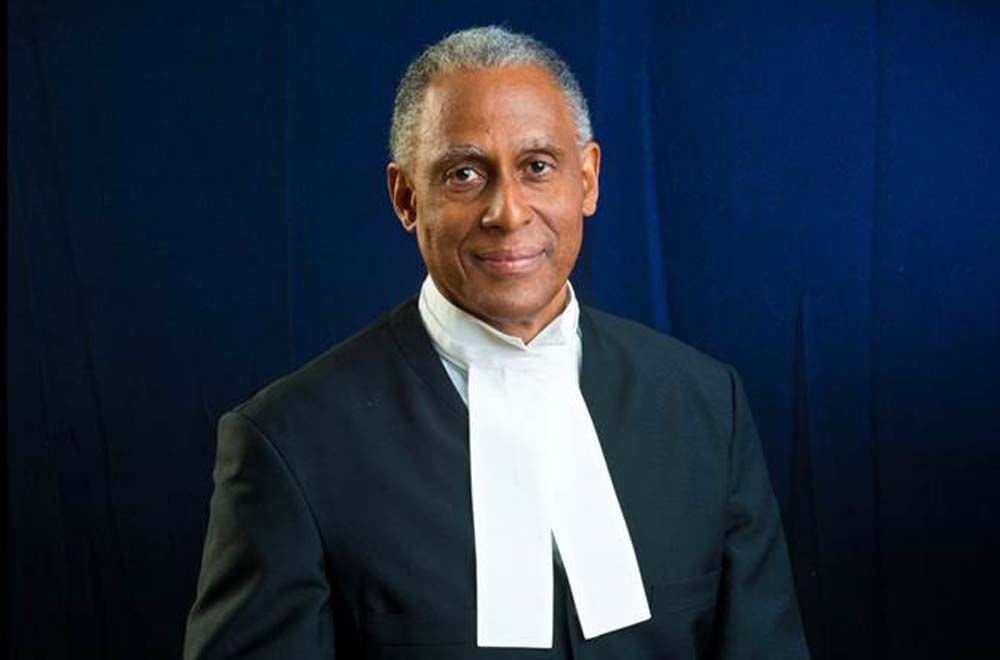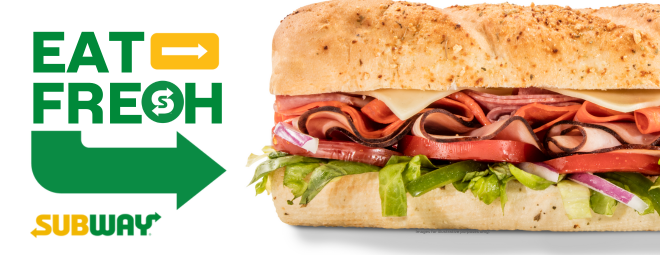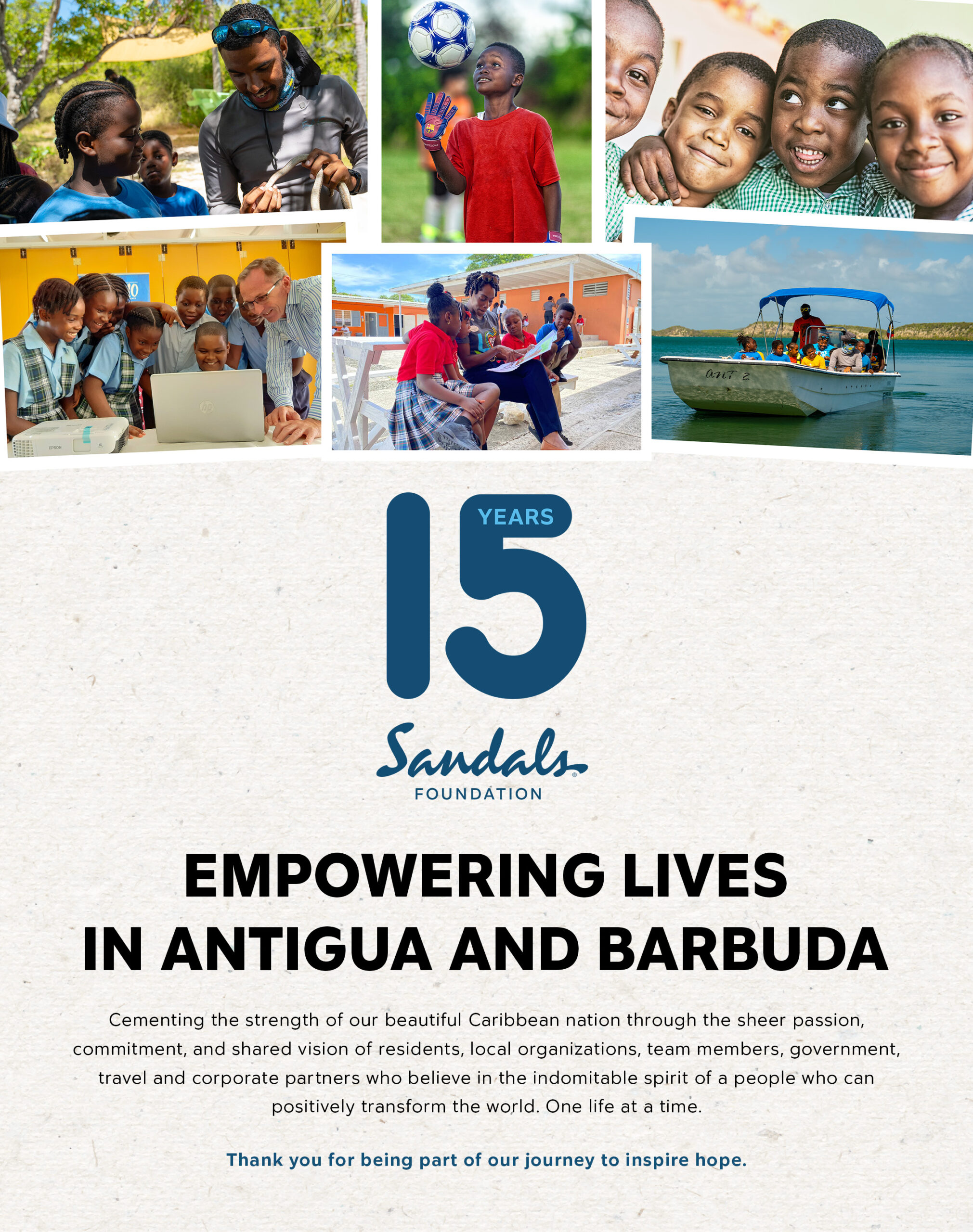
President of the Caribbean Court of Justice (CCJ), Adrian Saunders, Wednesday said while he will not tell citizens of Antigua and Barbuda how to vote in the upcoming referendum on the CCJ, he has a duty nonetheless to provide accurate information about the Trinidad-based court.
Antigua and Barbuda will hold a referendum on November 6 to decide whether or not to replace the London-based Privy Council with the CCJ as the island’s final court.
Speaking on a radio programme here on Wednesday, Justice Saunders, the third Caribbean national to head the CCJ that was established in 2001, said his presence on the island “is to provide information about the court and I think I have a right to do that and I fully intend to do that”.
He told radio listeners that the CCJ, which also functions as an international tribunal interpreting the Revised Treaty of Chaguaramas that governs the 15-member regional integration movement, is much more accessible than the Privy Council.
He said research done in his homeland, St. Vincent and the Grenadines, over the last 30 years, had shown that there were 21 appeals to the Privy Council with 11 of those cases being civil matters.
“So that effectively the main stream ordinary people, only 11 people were able to appeal and this is out of thousands of cases that the Eastern Caribbean Court of Appeal would have dealt with.
“Why is it only 11 people appeal? In a healthy democracy, the rule of thumb is that about 10 per cent of your cases are appealed further,” he said, noting that “11 persons appealed because all of those persons were either persons with substantial means or they were companies..
“What this effectively mean is that ordinary people are effectively denied the opportunity to appeal their cases further. Now this is not only frustrating to the particular person who gets a decision from the Court of Appeal that they are unhappy with and they would like to challenge, but it is also stultifying of the country’s jurisprudence because as you would know the way in which a light is shone on our laws is that somebody has to bring a case”.

He said that if there is a certain of law that is uncertain “you can’t get an ordinary person to test that before your highest court because it is simply too expensive”.
He told radio listeners that the CCJ caters for this by having special procedures for persons “who are of insubstantial means” making reference to the “poor people application” which has been accessed by between five and 10 per cent of the cases heard by the CCJ.
Saunders, who met with members of the main opposition United Progressive Party (UPP) on Tuesday, said that “the CCJ is a court that is available to ordinary people whereas the Judicial Committee of the Privy Council is available only to persons with substantial means”.
Saunders dismissed suggestions being made in some circles here that there is need to “fix” the lower courts before any attempt is made to join the CCJ.
“The role of a final court is not just to operate as a post office box that you put in an appeal and get out a result. That is not how final courts operate in other countries. Final courts are involved in interacting with and interfacing with the local justice system below them so that they can improve the local justice system so that they could out a finger on inefficiencies in that system.”
He said that this interaction could assist in ensuring that the systems below “operate in a fair and effective manner.

“I have heard some persons make the point that ‘well the local justice systems are in trouble or that they not functioning efficiently, so where are we going with the CCJ and this astounds me because this is putting things on its head. It is putting things in a topsy-turvey manner.
“It is precisely because you want to tweak those systems, you want to render them more efficient, you want to have your final court interacting and interfacing with the systems below that you need a court that is responsive and that is able to do these things”.
Justice Saunders said that the CCJ has been successfully undertaking such a process in Guyana, one of four Caribbean Community (CARICOM) countries that have made the CCJ, its final court, the others being Barbados, Belize and Dominica
“The Privy Council is too remote, is too detached in order to make that kind of intervention. So when people say that ‘oh there are these problems in the courts below and so we need to remain with the Privy Council, it is ridiculous because remaining in the Privy Council does nothing to address those problems of the courts below”.
Justice Saunders said it would be interesting for persons questioning the functioning of the CCJ to ask persons residing in Dominica, Barbados, Guyana and Belize to give an account of their interaction with the Trinidad-based court that has both an Original and Appellate Jurisdiction.
He also questioned the thinking of Caribbean people who say they prefer to trust “English people” at the Privy Council.
“If you say that trust is the main issue is it that Caribbean people are inherently dishonest? Is it that Caribbean people are inherently untrustworthy? Is it that Caribbean people are inherently incompetent, ineffective, I don’t agree with that.
“We trust persons whom we don’t know. We don’t know their background, we don’t know what are the social influences that have formed them, we don’t know what are their attitudes\ towards the Caribbean aspirations and goals, but we say we trust them,” Saunders told radio listeners.
He said that the CCJ is no longer an idea “it is not a concept, it is a living reality, it has been operating for 13 years.
“The people of Barbados, of Guyana, of Belize, of Dominica they have interacted with the CCJ. Why don’t we hear from those people and find out what has been their experiences,” he said, brushing aside arguments that the CCJ tends to be supportive of governments in offices.
Justice Saunders used the recent case where the former Barbados prime minister Freundel Stuart had threatened to leave the court because of a ruling.
“Some people say, oh that’s a court that can be interfered with politically. Well we have given a lot of decisions in relation to matters brought by governments and most of those cases we have found against governments than we have found for them.
“Not because we want to do that but because that is how we perceive the merits of the cases to be,” he told the radio listeners here.
Advertise with the mоѕt vіѕіtеd nеwѕ ѕіtе іn Antigua!
We offer fully customizable and flexible digital marketing packages.
Contact us at [email protected]

















All the news outlets are biased in my view. Where are the persons to speak for staying with the privy council ? The problem here is that people just do not trust the system in the region. We have seen so much interference in the lower courts so why should we have any faith in a higher court that is overseen by the same regional judges and lawyers?
I will end with this. Look at the American lady that was fought with a weapon in her luggage here in Antigua; she was given a year in prison and the sentence was overruled by politicians and the lady was set free. Are we to assume that a Caribbean run CCJ will be totally immune from things like this?
Yup. very biased indeed, but they cannot “brainwash” me tarl tarl. I hope the majority will reject the CCJ! As someone opined the CCJ judges are “politicians in robes”
Independent Nation holding on to BRITISH umbilical cord when they trying to cut it.Amazing
reminds of independence when England giving it and we pushing against
it.
There was a foolish comment from a single judge once, but it was addressed and they are certainly not trying to cut ties with us from the Privy Council.
As much as some are speaking about cutting the cord, we still apparently need the British to tell us about humane conditions, and we still need the UK Foreign Office to help our court finally now get sentencing guidelines: 51 years on.
Every single thing you purchase has an umbilical cord attached to it, once you pay for it.
Can any of the Nay Sayer give a specific example of political interference in the lower courts. Not just baseless accusations. A specific case where they can proof that there was political interference. That is all.
Cause I am tired or hearing these accusation without haven brought any proof to the table. The courts have ruled for and against politicians. And that is how judgement is. Sometimes it is in your favor sometimes it isn’t. The two Barbudans won in the lower court and the government was successful in the appeals court.
Perhaps you can direct your question to the Chief Justice of our Eastern Caribbean Supreme Court who brought to the public domain the reality there had been a rise in attempts at interference with the judiciary.
So says the court itself; no one has denied it. Who else do you want to hear about it from??
Some time ago a member of the Privy Council made a rather eloquent and helpful assessment of the willingness of the Privy Council to continue as the final court of appeal for as long as they are wanted. It was stated that they were more than willing to use technology to make appearing before the court more affordable. I do believe they are far and away the more mature and independent court and should be kept as the final court of appeal until the lower courts are brought up to an acceptable standard. This will not happen until these courts are properly funded and modernized. In listening to the current president of the CCJ this morning I was not impressed with the case he was making for adoption of the CCJ. If he is the best they can do better stick with the Privy Council.
Thank you kindly. It in a nice nutshell.
Comments are closed.